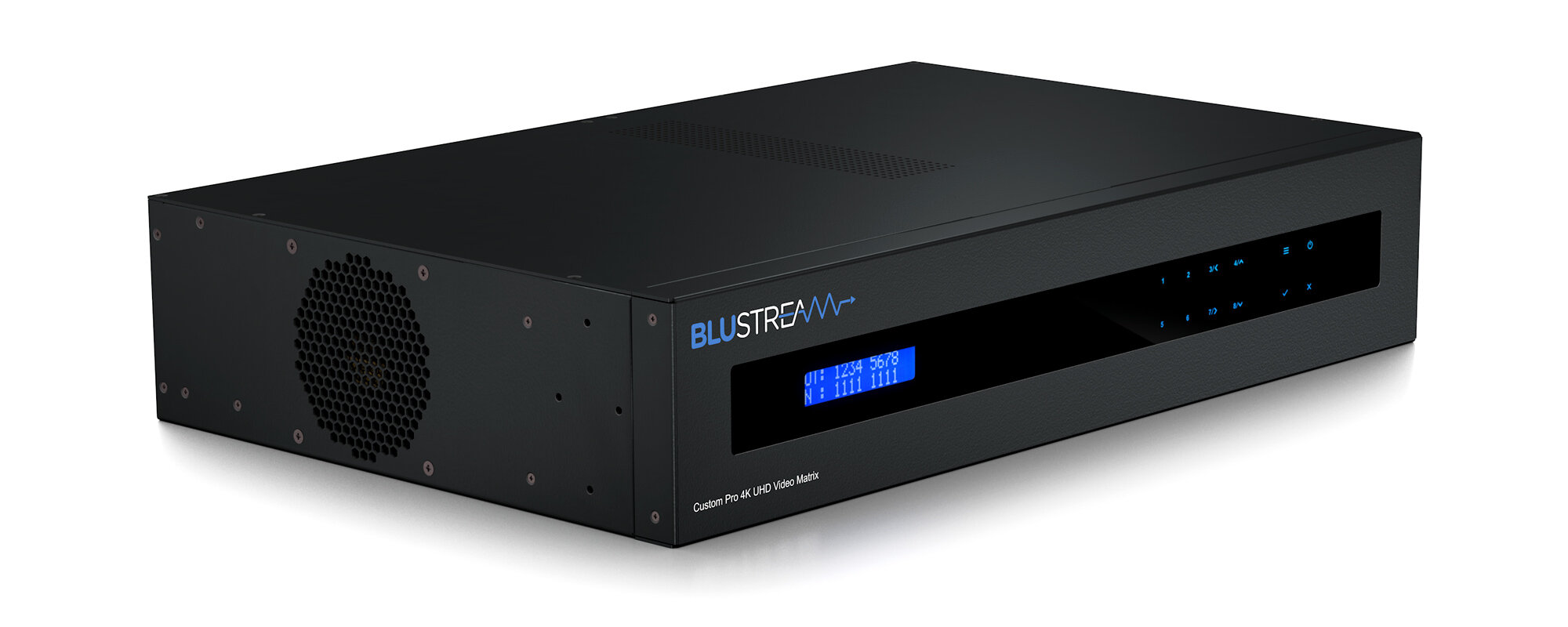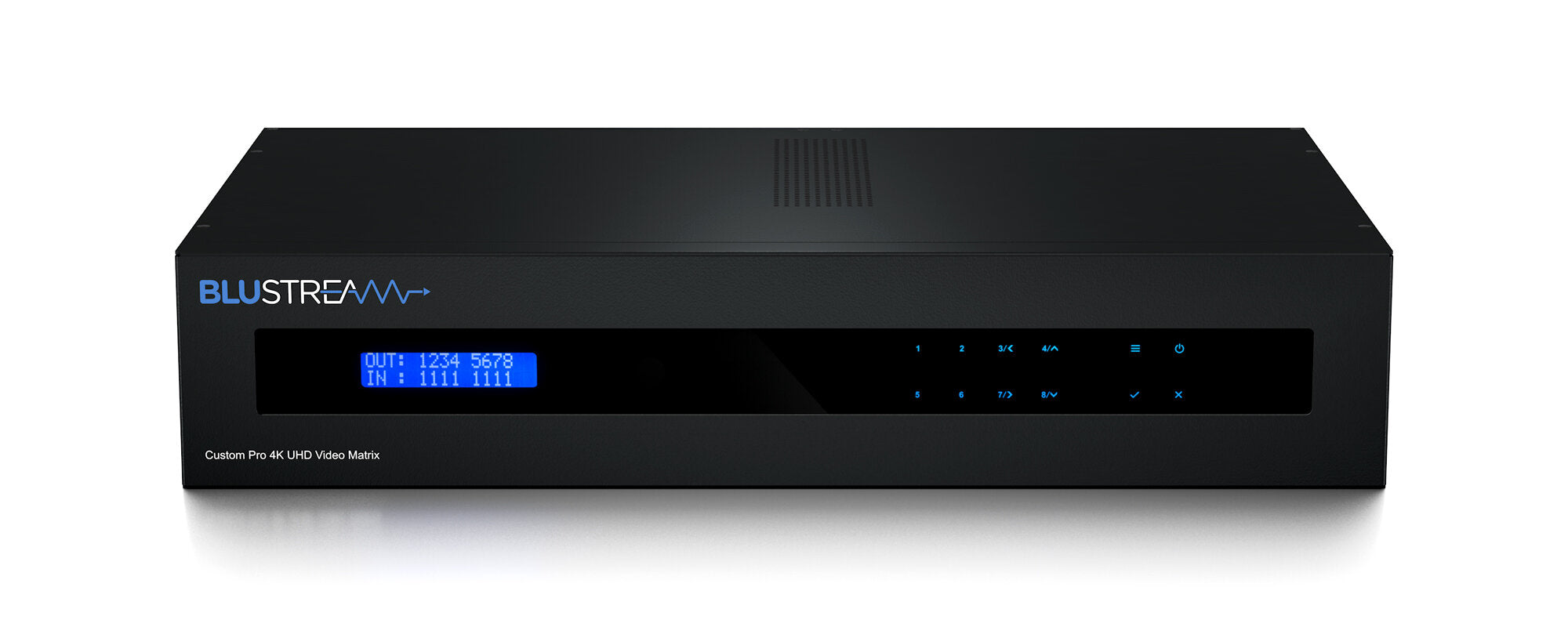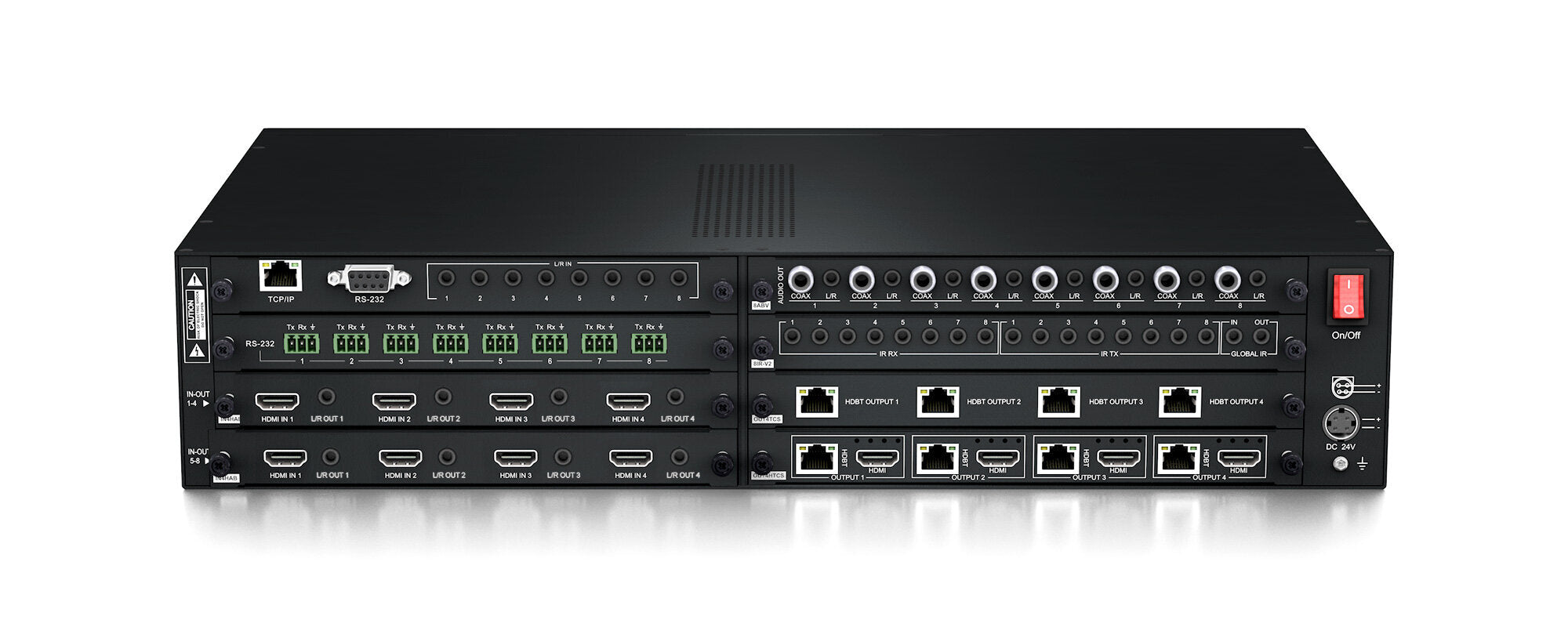PRO88HBT100CS
Custom Pro 8x8 HDBaseT™ CSC Matrix (4K 60Hz 4:4:4 up to 70m) - Supports 4K HDR, IP & RS-232 Control, PoC, 2-Way IR, 4 x Simultaneous Outputs and Audio Breakout with Volume Control

Description
Our 100m Custom Pro 8x8 HDBaseT™ CSC Matrix offers unprecedented 4K HDR performance for the custom installation market.
The PRO88HBT100CS is a HDMI 2.0 4K 60Hz 4:4:4 HDCP 2.2 Matrix utilising CSC technology to deliver HDMI, Bi-directional IR, PoC up to lengths of 100m over a single CAT cable (4K HDR up to 70m) with independent down-scaling of 4K video inputs on the CSC HDBaseT™ outputs to allow displays only capable of supporting lower video resolutions to receive 4K video while still showing maximum original 4K UHD resolution on the higher-definition displays.
The Matrix also provides advanced features including 4 x simultaneous HDMI outputs, audio breakout with line level pre amp volume control and a web browser interface module for control and configuration of the matrix.
Key Features
-
HDBaseT™ technology offering distribution of video and audio over a single CAT cable
-
Advanced Colour Space Conversion (CSC) supports HDMI2.0 18Gbps specification including HDR
-
Features 8 x HDMI inputs which can be independently routed to 8 x HDBaseT™ outputs
-
Supports 4K 60Hz 4:4:4 UHD video up to 70m
-
Independent down-scaling of resolutions up to 4K 60Hz 4:4:4 video input to the following formats:
- 1080p 60Hz (for screens that do not support 4K)
- 4K 60Hz 4:2:0 (for screens that do not support full 4K 60Hz 4:4:4)
-
Supports 4K with HDR
-
Extends HDMI 1080p video up to 100m
-
4 x Simultaneous HDMI Outputs
-
Supports all industry standard video resolutions including VGA-WUXGA and 480i-4K HDR
-
Supports all known digital HDMI audio formats including Dolby TrueHD, Atmos; DTS-HD Master Audio and DTS:X transmissions
-
8 x simultaneous coaxial digital and variable line level analogue L/R audio outputs
-
Analogue audio input can be embedded onto any HDMI input
-
Web interface module for control and configuration of matrix
-
Supports bi-directional IR / RS-232
-
Supplied with Blustream IR receivers and emitters
-
Control via front panel, IR, RS-232 and TCP/IP
-
Supports PoC (Power over Cable) to power compatible HDBaseT™ receivers
-
3rd Party drivers available for major control brands
-
2U Design for 19" rack mount integration - Mounting kit included
-
Advanced EDID management
-
HDCP 2.2 compliant
-
To be used with the HEX100CS-RX receivers
Specifications
-
Video Input Connectors: 8 x HDMI Type A, 19-pin, female
-
Video Output Connectors: 8 x HDBaseT™ RJ45 connector, 4 x HDMI Type A, 19-pin, female
-
Audio Input Connectors: 8 x 3.5mm stereo jack (L/R)
-
TCP/IP Control: RJ45, female
-
Ethernet / Network: RJ45, female
-
IR Input Ports: 9 x 3.5mm stereo jack
-
RS-232 Serial Port: DB-9, female
-
Rack Mountable: 2U rack height, rack ears included
-
Casing Dimensions (W x H x D): 440mm x 87mm x 282m without feet
-
Dimensions Including Connections (W x H x D): 440mm x 94mm x 288mm with feet
-
Shipping Weight: 5kg
-
Operating Temperature: 32°F to 104°F (0°C to 40°C)
-
Storage Temperature: -4°F to 140°F (-20°C to 60°C)
-
Power Supply: 24V/8A DC
Colour Space Conversion (CSC) Technology in HDBaseT™
Due to the data rate of HDBaseT™ technology being capped at 10.2Gbps, it is unable to pass the latest native 4K UHD resolutions of 4K 60Hz 4:4:4. There is now a requirement to integrate video resolutions with data speeds up to 18Gbps across a multi-zone AV environment. Blustream have implemented CSC (Colour Space Conversion) technology into our latest products to ensure 4K HDR signals can now be supported over the limited infrastructure of HDBaseT™. Colour Space Conversion reduces the data rate of the HDMI signal by converting the colour space from 4:4:4 or 4:2:2 to a lower format. Within Colour Space Conversion technology the native resolution and frame rate remain constant from end to end. The only part of the signal that is converted during transmission is the colour. Blustream CSC products do not support HDR10+ or the dynamic variation of Dolby Vision due to the way these specific variations of dynamic HDR (dHDR) are encoded. These codecs transmit repeated metadata packets throughout the transmission of any media making it impossible at this stage to convert in the same way using CSC technology.







